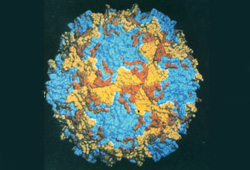Summary
Definition
History and exam
Key diagnostic factors
- unimmunized status
- residence or travel in endemic area
- decreased tone and motor function of affected limb
- decreased tendon reflexes of affected limb
- muscle atrophy of affected limb
Other diagnostic factors
- age <36 months
- gastrointestinal prodrome
- fever
- malaise
- respiratory muscle atrophy and respiratory distress
Risk factors
- lack of vaccination
- poor sanitation
- poverty
- area of endemic infection
- immunosuppression
Diagnostic tests
Tests to consider
- virus culture from stool, CSF, or pharynx
- PCR plus sequencing
- CSF analysis
- serum antibodies to poliovirus
- MRI of spinal cord
- electromyelogram (EMG) of affected limb
Treatment algorithm
Contributors
Authors
Omar A. Khan, MD, MHS, FAAFP

President and CEO
Delaware Health Sciences Alliance
Physician Leader, Partnerships & Academic Programs
Christiana Care Health System
Associate Professor
Department of Family & Community Medicine
Sidney Kimmel Medical College of Thomas Jefferson University
Newark
DE
Disclosures
OAK is an author of a number of references cited in this topic.
David L. Heymann, MD, DTM&H
Professor of Infectious Disease Epidemiology
London School of Hygiene and Tropical Medicine
University of London
Head
Centre on Global Health Security - Chatham House
London
UK
Disclosures
DLH is an author of a number of references cited in this topic.
Peer reviewers
Javed M. Gilani, MD, FRCP, FACP
Assistant Clinical Professor
Jefferson Medical College
Philadelphia
PA
Disclosures
JMG declares that he has no competing interests.
Gregory Pappas, MD, PhD
The Nordin M. Thobani Professor and Chairman
Department of Community Health Sciences
Aga Khan University
Karachi
Pakistan
Disclosures
GP declares that he has no competing interests.
Peer reviewer acknowledgements
BMJ Best Practice topics are updated on a rolling basis in line with developments in evidence and guidance. The peer reviewers listed here have reviewed the content at least once during the history of the topic.
Disclosures
Peer reviewer affiliations and disclosures pertain to the time of the review.
References
Key articles
Heymann DL, Aylward RB. Eradicating polio. N Engl J Med. 2004 Sep 23;351(13):1275-7. Abstract
Global Polio Eradication Initiative. GPEI Strategy 2022-2026. 2021 [internet publication].Full text
Farbu E, Gilhus NE, Barnes MP, et al. Post-polio syndrome: EFNS guidelines on post-polio syndrome. In: Gilhus NE, Barnes MP, Brainin M, eds. European Handbook of Neurological Management, Volume 1. 2nd ed. West Sussex, UK: Blackwell Publishing Ltd.; 2011:311-9.
Centers for Disease Control and Prevention. Polio: polio vaccination for international travelers. Jul 2024 [internet publication].Full text
Reference articles
A full list of sources referenced in this topic is available here.
Use of this content is subject to our disclaimer

